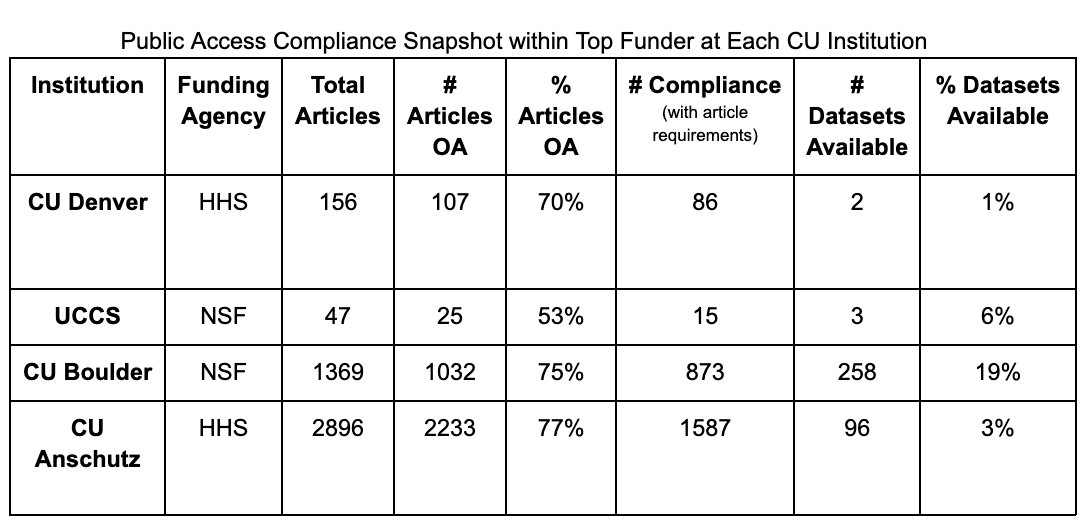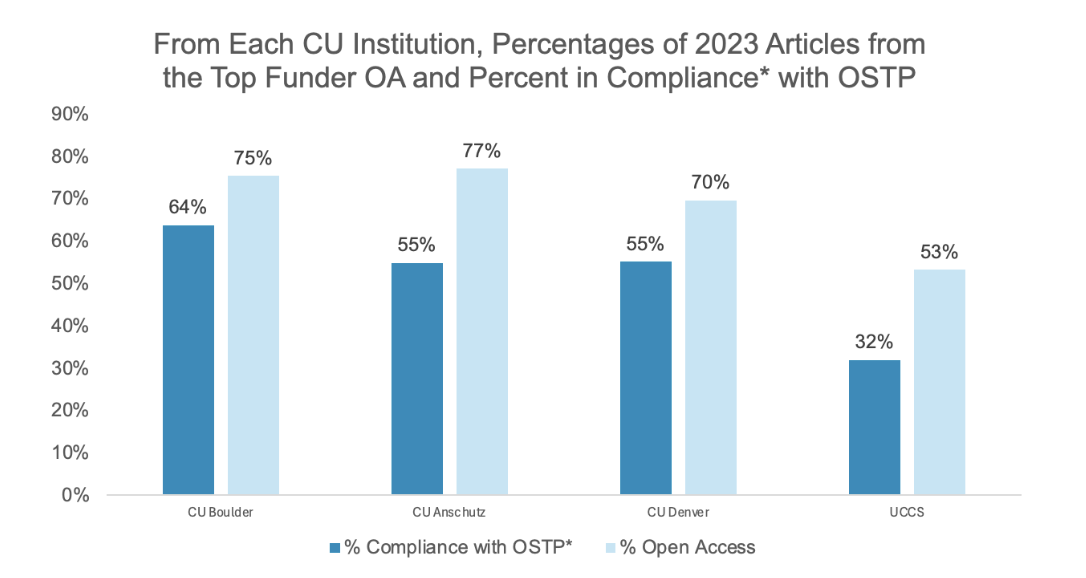Faculty Voices - Growing Pains: Analysis Explores Opportunities to Expand Public Access to Federally Funded Research
Melissa Cantrell. Scholarly Communication Librarian, Assistant Professor
Center for Research Data and Digital Scholarship |University Libraries | University of Colorado Boulder
Sara Satkowiak. SRS Program Lead Librarian, Auraria Library, CU Denver
Hannah Pollard. CU Anschutz Health Sciences Library, Clinical Instructor
In 2022, the Office of Science and Technology Policy (OSTP) at the White House issued a Memo on “Ensuring Free, Immediate, and Equitable Access to Federally Funded Research,” which lays out an updated public access policy for “broad and expeditious sharing of federally funded research.” The University of Colorado System drives innovation, discovery, and industry worldwide, and much of the funding for this research and development comes from federal funding and sponsored research grants. According to the latest analysis, CU faculty received a record $1.7 billion in sponsored research funding in 2023-24, $942.8 million of which came from federal agencies. Federal agencies such as the National Aeronautics and Space Administration (NASA), Health and Human Services (HHS), the National Science Foundation (NSF), and others invest in research and development to spur the industries and innovations that make the United States a world leader in science and technology.
Most notably, this updated public access policy guidance, known as the Nelson Memo, expands coverage of this policy to research grants from any federal agency and requires immediate public access to research outputs resulting from federally funded research, including peer-reviewed research articles and research data.
Considering the breadth and volume of the University of Colorado’s engagement with federally funded research, this policy guidance will impact many faculty and research staff. CU must respond by promoting equitable access and validity of research results to have continued success receiving federal research funding.
Current Compliance on each Campus:
To this end, the authors of this article, consisting of one librarian from each of the University of Colorado campuses, created a snapshot of current compliance. According to the new public access guidance from the OSTP, compliance consists of peer-reviewed articles made publicly available by either self-archiving the postprint version of the paper or by publishing Open Access (OA) directly via the journal, as well as making eligible datasets publicly available. This article aims to identify where improvements are needed before the Nelson Memo takes effect on December 31, 2025.
We utilized the Web of Science index of scholarly publications to analyze 2023 publication data for articles from each institution. To make the scope of this snapshot more manageable, we also limited our snapshot to the top federal funding agency for each institution. Below you can see a table and chart visualizing compliance at each campus.


*For the purposes of this snapshot, we are only counting % compliance with article public access requirements; data sets are not included in this calculation
While articles from top funding agencies are made OA across CU institutions from half to three-quarters of the time, actual compliance with new federal guidance is somewhat lower, with about two-thirds of CU Boulder articles, a little over half of CU Anschutz and CU Denver articles, and just under a third of UCCS articles complying. This compliance rate shows positive movement towards achieving public access mandates; however, there is still significant room for improvement. We also note there is significant improvement needed in providing public access to datasets associated with federally funded research. While not all datasets can be made publicly available and some articles may not have associated datasets, the current rate at which research is provided with associated datasets is quite low across all CU institutions.
Overall, CU boasts an impressive amount of sponsored research, and the push for increased public access has gained some traction, as we see from this snapshot. In order to continue meeting federal funder expectations, everyone involved in research at the CU campuses will need to prioritize resources and education around open and public access options, as well as make significant strides in dataset availability.
We encourage anyone with questions about compliance with federal public access guidelines to utilize the resources below.
CU Denver:
Sara Satkowiak - Scholarly Research Services Program Lead Librarian
Katy DiVittorio - contact about open access agreements with publishers
Research consultations with Auraria Library faculty for CU Denver faculty to select OA journals for publication
Small Grants Program for College of Liberal Arts and Sciences: available to assist with APCs for articles to be published open access (up to $1000)
CU Boulder:
Melissa Cantrell - Scholarly Communication Librarian; open access funding
CU Scholar - institutional repository for self-archiving of research outputs, including datasets
Learn more about Guidance for Public Access to Federally Funded Research
Open Access agreements with publishers
CU Anschutz:
Hannah Pollard - Scholarly Communications Librarian
Strauss Library Publishing Guide - Includes information on data management, open access, predatory publishing, and more
CU Anschutz Digital Collections - Institutional repository for self-archiving, including certain types of datasets
While Strauss Health Sciences library does not have a fund to cover article processing charges, we have agreements with select journals. Learn more about Strauss Library’s article processing cost agreements in our publishing guide.
UCCS:
OA Fund - Open Access | Office of Research (uccs.edu)
Office of Research - for help with federal grants Office of Research (uccs.edu)
Reach out to Kraemer Family Library for support with OA options and agreements






Add new comment